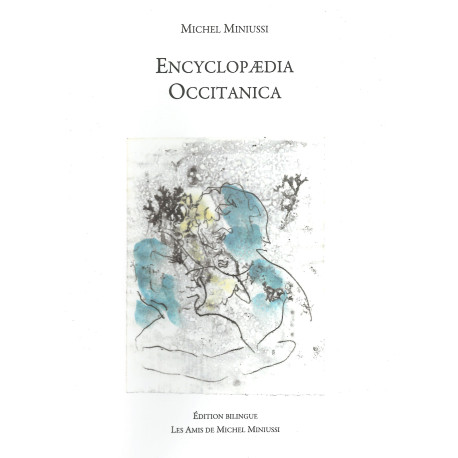Recently added item(s)
No products
Product successfully added to your shopping cart
There are 0 items in your cart. There is 1 item in your cart.
Literature
- New Selection
- Books
- Music
- Videos - DVD
- Miscellaneous
- Revues, Journaux
Links
Encyclopædia occitanica - Michel Miniussi (bilingual edition)
L-9782950951996
New
3 Items
Available
22,00 €
Encyclopædia occitanica (bilingual edition) - Michel Miniussi wrote the Encyclopædia Occitanica from 1978 to 1983, a fruitful period of his literary work, with his remarkable elegance of style. This set of texts is finally published in a bilingual edition in Occitan and French, with illustrations by Michel JOYARD. Les Amis de Michel Miniussi.
Data sheet
| Type | Paperback |
| Year | 2022 |
| Language | French + Occitan Provençal |
| Pages | 178 |
| Format | 17 x 24 cm |
| Distributor | Les Amis de Michel Miniussi |
| ISBN | 978-2-950951-99-6 |
| Bonus | 26 illustrations de Michel JOYARD |
More info
Encyclopædia Occitanica - Michel Miniussi (bilingual edition)
Edition in Occitan and French languages.
The "Encyclopaedia Occitanica" is one of the first works of Michel Miniussi, who started it in 1978, from the first notebooks he started to keep, and who continued it for years, until he prepared a final typescript in 1988. As for his other works, whether Hortus deliciarum, Lei Passatemps or the other works, he reworked his texts, the genesis of which can be followed in the notebooks. He left out some texts from the final selection, like those that were in the draft stage on Midòns or on Lafont (Robert).
Miniussi says there a country without territory and without nation, a country that for him is entirely made of literature and language. Hence the choice of articles which, at first sight, are mostly related to the literary and personal preferences of the author, as well as to an Occitania or to occitanists of which he speaks only to say their lack of scope and ambition, to criticize their non-existence. But something like a lived Occitania emerges in the mirror, which, although not a nation, can exist within itself, within the writer who, by kneading his language and his thought, comes to make of it the image of this country of dream much more made to love than to claim.
Bilingual book (occitan-french).
Introduction by Xavier BACH. Illustrations by Michel JOYARD.
Translation : V. Champollion, J.C. Foret, P. Gardy, T. Offre, J.P. Tardif, F. Voilley.
Review committee : Jean-Pierre TARDIF, Frédéric VOILLEY and Jean-Claude FORET.
Association « les Amis de Michel Miniussi ».
The author:
Michel Minuissi was born in PARIS on August 15, 1956.
He spent his youth in Cannes with his mother's family, a Provencal of long tradition. At the age of 17, he came into contact with the Occitan language group of Nice and actively participated in the publication of their review "La Beluga".
He continued his university studies in Montpellier, under the direction of Robert Lafont, and specialized in Occitan literature, of which he became an active element, rigorous in his writing, brilliant and creative.
As a library curator in the Pays d'Oc, he maintains a rich and regular correspondence with writers of the Occitan language.
In addition, he writes and publishes, often anonymously or under a pseudonym, in the magazine OC, of which he becomes editor in 1986, of letters, literary notes, studies of authors, poems, essays...
In 1988, his first novel, Jiròni, was published by Jorn/Fédérop (presented by Robert Lafont).
After falling seriously ill in 1981, he continued to write with tenacity and to effectively promote the magazine OC, demonstrating a high standard in the choice of texts published, as well as in their literary quality.
His second novel, whose manuscript is entrusted to OC editions shortly before his death, Lei Passatemps, was published in early 1994 and earned him the Antigone Literary Prize, the same year in Montpellier.
Michel Miniussi died on January 9, 1992, leaving a considerable amount of unpublished writings.
Extract of chapiter VATICAN :
E pamens, que qué n’en digan lei doas tèstas bessonas de la moderna Gorgona, sociologia e politica, Occitània e la Roma papala (la vertadiera. Mèfi que Pius X es pas – s’en manca – Clement X !) son pas que doas províncias de la meteissa Arcàdia. Au païs nòstre, (perqué li dire de nòstre se deu existir en eu, fòra de tota projeccion dau desir – de l’idèa qu’avem dau viure – sus un campèstre, qunt que fuga ?...) tèrra d’amor segon lo sòmi ramondin ò mistralenc, tèrra de gaug ont s’apasiman tótei lei garrolhas de vila e de camp, de pòble gras e pòble magre, de gleisa e de sèmblagleisa, de lenga e de lengatge, païs de planas pacanas e de casteus, Lavaur, Fònt-Segunha, tótei li siam Gauromans e gentilòmes. Amb una diferéncia pamens : l’Arcàdia occitana es sempre vista d’a rebors, plèga de regrets, e lo temps di vièlhs d’antica bonomia lo ploravan adejà Pèire Cardenal e Montanhagòl ; son promier retrach, tot endaurat de sòmi e nostalgiá s’atròba dins lei Vidas e Razós.
Reviews
No customer comments for the moment.
 English
English Français
Français Occitan
Occitan







